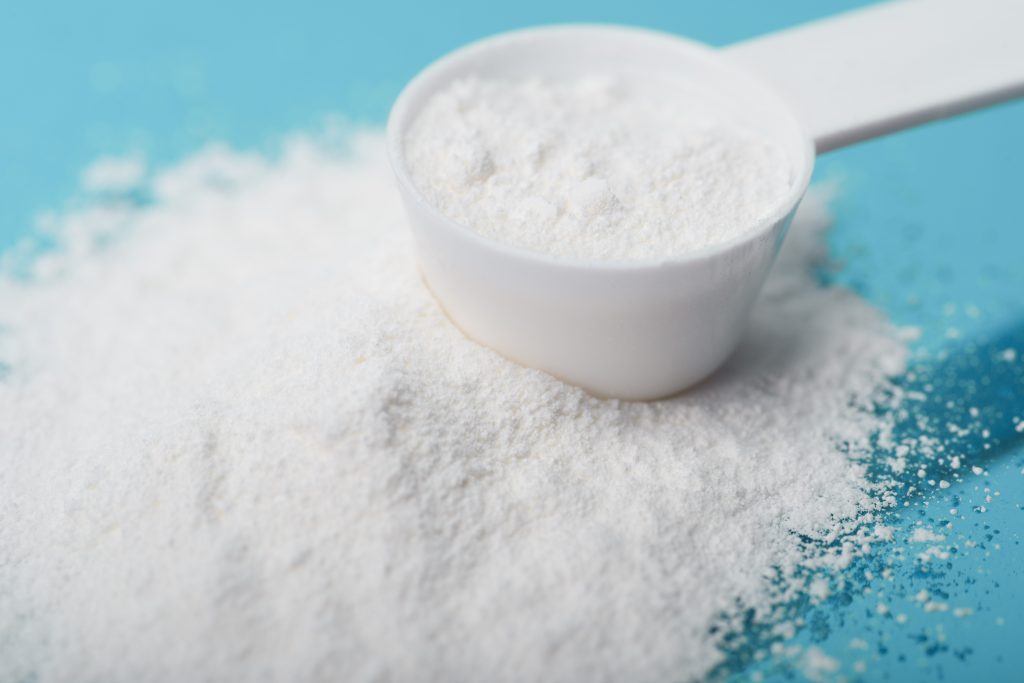If you’ve been looking for a new supplement to try, you might have come across HMB.
We’ve seen this compound rise in popularity over the last few years, with some promising research showing its efficacy.
But, you might be hesitant to try it. After all, you don’t know much about this compound, let alone how to take it and when.
To help you make an informed decision, I’ve put together this guide for you. Below, we’ll go over everything you need to know about HMB, what it is, what benefits it offers, and when you might want to take it.
Ready? Let’s dive in.
What is HMB, And What Benefits Does it Offer?
HMB (beta-hydroxy-beta-methylbutyrate) is a supplement that’s been around for a long time. It’s a metabolite of leucine – an amino acid with proven effects in the body. Most notably, leucine plays a vital role in muscle protein synthesis and is crucial for muscle gain and recovery.
Okay, but HMB is a metabolite of leucine. Can we expect it to deliver amazing results for us?
To answer this question, we first need to look at HMB’s mechanism of action in the body. As we discussed just above, HMB is a metabolite of leucine. Meaning, it’s a naturally-occurring substance from leucine breakdown. It behaves similarly to the amino acid – it inhibits muscle protein breakdown and stimulates protein synthesis.
But does it work? Well, research certainly seems to suggest so. For example, in one recent study, researchers had combat athletes supplement with HMB or a placebo for twelve weeks (1). The goal was to evaluate HMB’s effects on exercise capacity and body composition.
Specifically, the subjects were given 1,000 mg of HMB per day for twelve weeks. They then had a ten-day washout period before being given a placebo for another twelve weeks.
At the end of the trial, researchers saw significant differences. When subjects took HMB for twelve weeks, they saw marked fat loss and muscle gain, and physical capacity improvements. However, there weren’t any differences in blood markers between placebo and HMB supplementation.
Another twelve-week study on resistance-trained individuals shed light on HMB’s effects on the body (2). That study went through three distinct phases:
- An eight-week periodized resistance training program
- A two-week overreaching phase
- A two-week taper
Twenty-four subjects began the study, and four dropped out within the first four weeks. The remaining twenty resistance-trained men were given a placebo or HMB daily. At the start, they had an average squat of 1.7 times bodyweight squat, 1.3 times bodyweight bench press, and two times bodyweight deadlift. So, each of them was reasonably strong and muscular.
Researchers examined muscle mass, strength, and power four times – at the start of the study and on weeks four, eight, and twelve. Their goal was to assess HMB’s effects on these parameters, as well as on cortisol, testosterone, and creatine kinase.
At the end of the trial, the results were promising. Across the board, subjects that were given HMB saw greater improvements in lean tissue, strength, and power. Researchers also found that the HMB group also saw smaller declines in training performance during the overreaching phase.
There is one more paper worth looking at today, and it is from 2009 (3). Here, researchers aimed to see what effects HMB supplementation would have on novice trainees. Researchers split 17 subjects into two groups: one given HMB, and the other given a placebo. They also had to follow a training program for twelve weeks. Here is where things get insane:
The group taking HMB gained more than twice the strength and muscle mass and lost more than twice the fat mass. The group taking HMB gained, on average, 22 pounds of muscle (10 kilograms) over twelve weeks. In comparison, the placebo group gained about 9 pounds of muscle (4 kilograms). In other words, they experienced a fantastic fitness transformation in three months.
So, what does this mean for HMB?
Well, we certainly need more (and longer-term) research before we can say for sure. But are these findings promising? They certainly are. It appears that HMB could prove itself to be a useful supplement for everyone who is looking to build muscle, lose fat, get stronger, and improve their fitness.
When Should You Take HMB?
HMB is primarily known as an anti-catabolic agent, which should give us some idea of how and when we should take it.
What are the primary objectives during a fat loss phase? That’s right, to maintain our muscle mass (or possibly increase it a little) while shedding fat. This would allow us to get leaner more quickly and without having to lose as much total weight. For instance, instead of having to lose 25 pounds (15 pounds of fat and 10 pounds of lean tissue) to get decently lean, you might only have to lose 16-17 pounds (13-14 pounds of fat, and 2 to 3 pounds of lean tissue).
Besides not taking as long, you can keep most of your muscle and athletic abilities.
So, we recommend supplementing with HMB mostly while cutting. The research we examined today showed that HMB supplementation allowed subjects to achieve a decent recomposition. At the very least, it should allow you to maintain what you currently have, even if you don’t gain extra muscle.
HMB can also be valuable for bulking thanks to its muscle-building effects on the body. The question is, should we supplement with this metabolite while cutting and bulking, or should we save it up mostly while getting lean?

Should You Cycle HMB (Is There Value In Not Taking It Periodically)?
So far, we don’t know. Given that HMB is a natural metabolite that occurs in the body, logic would dictate that supplementing with it all of the time is perfectly fine. After all, HMB is present in the body at all times, so why shouldn’t we take it often to reap benefits?
There is one crucial thing to consider here:
There is a difference between endogenous (having an internal origin) and exogenous (having an external source) amounts of different substances. In general, the body is pretty good at supplying itself with the various compounds it needs to function optimally. It can use various processes and take advantage of different metabolic pathways, enzymes, hormones, neurotransmitters, and cells to achieve an outcome.
But exogenous administration of different compounds can change the body’s internal dynamics. Take, for example, testosterone:
Optimizing the body’s ability to produce enough of the hormone boasts many health benefits, including more muscle, strength, energy, confidence, and a higher libido. Exogenous administration also seems beneficial and offers some fantastic benefits. But here is the thing:
This is not something the human body is accustomed to, and injectable testosterone can change testosterone production dynamics. It’s not uncommon for long-term testosterone supplementation to hinder the body’s ability to produce the hormone.
Now, I’m not saying that exogenous testosterone and HMB are inherently the same, but this gives you some food for thought. Until we have some longer-term research on HMB supplementation, our recommendation would be to cycle it.
How to Dose HMB For Best Results
Research seems to find a dose-dependent response to HMB supplementation (4). Specifically, it appears that more HMB results in lesser markers of muscle damage, smaller levels of protein degradation, and improvements in strength.
So far, research finds that around three grams per day are the safe spot for supplementation (2, 4).
Studies so far tend to use a standard protocol of three doses of one gram. For instance, one at breakfast, one around noon, and one around the evening.
HMB has a half-life of around 2.5 hours, and levels go back to baseline around nine hours after ingestion (4). For instance, if you consume 1000 mg at 8 AM, you should have around 500 mg in your system by 10:30 AM, and levels should be at baseline by 5 PM.
Should Beginners Supplement With HMB?
If you’re newer to training, you might be wondering if supplementing with HMB is worth it? After all, wouldn’t the newbie gains be enough for you to gain a lot of muscle mass in your first year of training?
Well, one of HMB’s mechanisms of action seems to be that of limiting exercise-induced muscle damage. As we know, muscle damage can limit growth since the body has to repair the tissue before it can grow and strengthen it.
In theory, causing a significant enough stimulus (in the combination of metabolic stress and mechanical tension) and limiting muscle damage should result in optimal growth (5, 6).
So, what does this mean for beginners?
Well, we know that muscle damage seems to limit muscle growth for beginners, even more so than it does for advanced trainees. The reason is, beginners aren’t used to the stresses of training, so they tend to experience much higher disruptions in the face of metabolic stress and muscle damage.
It would make sense that beginners supplementing with HMB would gain a ton of muscle mass, much more than they usually would without it. This is also supported by several studies on HMB supplementation in untrained people (3).
What to Buy
If you want to give HMB a try, I suggest you check out the Nutricost HMB Powder on Amazon. It’s the least expensive option I could find and Nutricost seems to be a reputable brand (I use it). At the time of this writing, this product has 4.5 stars with over 1300 ratings. I suggest the powder because it’s less expensive and if you are going to take the recommended 3 grams per day, it can be a lot of caps to swallow. Click the link above to go to Amazon and check it out.
Now, with or without the HMB, it’s time to go…. Pump Some Iron!

